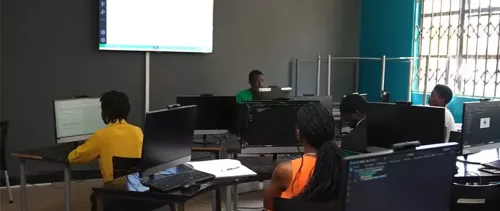

Summary of the knowledge shared and discussions held during the Gender and Digital Development clinic held by the Mashreq Gender Facility in February 2022.
Picture this: Rania, an engineering graduate from one of Jordan’s universities, was excited about a career in the booming tech industry. Not so far away in Iraq, Aseel, who sells homemade soap, dreamed of starting her own online business. And, slightly further south, Nadine, a long-time IT professional in Beirut’s business district, was anticipating a promotion to management. However, more than six months later, Rania is still looking for a job to kick-start her career, Aseel has yet to find the money she needs to transition her business online, and Nadine is still waiting for her promotion.
The Information and Communications Technology (ICT) sector in the Middle East and North Africa (MENA) region is vibrant and an engine for jobs. Yet, women in Iraq, Jordan, and Lebanon are often excluded from ICT jobs and resources. Rania’s scenario is not unique: In Jordan, 35% of engineering graduates are women, yet they represent less than 15% of the engineering workforce; in Iraq, the estimated gender gap in Internet access is 28%; and in Lebanon, the gap in mobile ownership is 17%, to women’s disadvantage.
Technology is not gender-neutral as women face additional barriers—structural, cultural, and economic—to equal participation in the digital economy. These barriers need to be overcome for digital development to live up to its potential in boosting shared prosperity. To dismantle the gender aspects of digital development, the World Bank identifies and addresses barriers and opportunities in five pillars: digital infrastructure, digital platforms, digital financial services, digital entrepreneurship, and digital skills – all of which apply when considering the topic in the Mashreq.
Against this backdrop, the World Bank Group’s Mashreq Gender Facility recently convened a four-session digital clinic for around 200 policymakers, entrepreneurs, incubators, multinational executives, and sector experts to discuss how to develop a digital economy supportive of women’s agency and participation in Iraq, Jordan, and Lebanon. The figure at the bottom summarizes the outcome of this meeting: it includes broad lessons demonstrating that digital transformation may prove to be a great equalizer for women entrepreneurs and workers in combination with a government-supported enabling environment, demand for skills and talent in the private sector, and accelerators and investors equipped with gender-sensitive support and investment strategies.
 Jubilee School students work on programming and developing their robots to work in a virtual space station at their school in Amman, Jordan, February 10, 2019. World Bank / Raad Adileh
Jubilee School students work on programming and developing their robots to work in a virtual space station at their school in Amman, Jordan, February 10, 2019. World Bank / Raad Adileh
What are the key lessons?
- Lesson 1: The role of government is central to fostering fairness and inclusive growth. Having a strong regulatory environment is key to creating a level playing field where firms thrive and the financial resources they need can be leveraged. Firms in the Mashreq, including start-ups, suffer as businesses are time-consuming and costly to start and license. They also suffer as they find it difficult to pay taxes, acquire export licenses, and enter markets. This particularly applies to those firms with less access to investment capital, which are disproportionately women-owned and women-led. Governments can help equip all members of society with the skills and the access to necessary infrastructure to take advantage of digital development by adopting concrete equity goals and allocating resources necessary to meet them.
- Lesson 2: The private sector is a driver of demand for skills and a vital source of digital employment. The private sector is vital for job growth in the MENA region, with the potential to expand opportunities in the digital economy. As documented in Jordan, when tech companies prioritize gender diversity, they profit while also closing the digital skills gap. A series of business case studies in the Mashreq identify several factors that can help employment in the private sector, such as access to women mentors, more representation in corporate structure (promoting female professionals like Nadine would not only be the right thing to do, but also make business sense!), financial resources for sectors where women are likely to start businesses, technical and business training, and collecting sex-disaggregated data on consumers.
- Lesson 3: Accelerators and investors can channel resources and forge connections in new ways. Given the low access to finance in the Mashreq, to help women like Aseel to transition her business to digital, establishing funding mechanisms through accelerators, incubators, and investors with ambitious gender-sensitive targets is necessary. They can open access to networks and markets, support training on business, ICT, and soft skills to close the digital and entrepreneurial skills gap between women and men. Strategies like Five One Labs 'Female Founders Fellowship promote role models, networks, and links between buyers and entrepreneurs to overcome market barriers.
- Lesson 4: There are many new tools that entrepreneurs can access to vastly expand their opportunities. Women entrepreneurs from Iraq, Jordan, and Lebanon and business development experts showcased many tools at our digital clinic. The tools included online learning platforms assisting in information and education; ICT-facilitating access to economic opportunities, flexible jobs, and new markets; and technologies improving service delivery and engagement. E-commerce tools allow women entrepreneurs to increase sales, enter traditionally male-dominated sectors, access business support services (such as training and accounting), and improve flexibility and adaptability.
- Lesson 5: The international community plays a key role as a convener and knowledge-sharer. The digital economy is fundamentally about cutting across boundaries and enabling new connections and opportunities. By bringing together stakeholders from different sectors, countries, regions, and markets, international institutions in the Mashreq can support the identification, targeting, and scaling up of innovations.
International actors can also call attention to the importance of early-age exposure to ICTs, which girls all too often lack, and connect employers directly with young women through events like the DigitalAg4Her hackathon. The World Bank uses its global knowledge base to place digital skills development in the gender arena. For example, it can direct digital stakeholders to the Solutions for Youth Employment program, which both stresses that digital skills are foundational to all sorts of industries, not just tech, and emphasizes that these skills need to be taught continuously to stay abreast of emerging technologies and opportunities. Public-private models can be used to disseminate learning, using flexible, blended delivery models incorporating mentoring and peer support – aspects that are particularly key for women’s inclusion.
Women like Nadine, Rania and Aseel do exist. Benefits of tech cannot be fulfilled without a digital ecosystem in which women and men are equally able to take part. Deliberate and committed action by all stakeholders is needed to realize these lessons and ensure that the digital economy provides increased opportunities for all members of society.


